Uzo Aduba on Netflix Series 'Painkiller' and Finding Her Place in Hollywood

Uzo Aduba once took her mom to the White House to have dinner with Barack and Michelle Obama. She also took the stage to sing with Taylor Swift during the Los Angeles stop on the megastar’s last tour. (“We were just being silly.”) And then there was the time she met Tony Bennett after doing a few concerts at New York City-area schools on behalf of his charity. And, of course, she’ll always cherish her 2020 wedding in New York City to cinematographer Robert Sweeting.
Mind you, Aduba, 42, isn’t one to brag about any of the above. She just keeps framed photos of these milestones on a shelf in her L.A. home office—and describes them only because a nosy interviewer prods her. Aduba is so refreshingly unassuming, in fact, that as soon as she logs on to the Zoom chat, she adjusts the angle of her laptop so her many, many trophies disappear from the screen. “I’m so sorry about that!” she says. “I saw it as soon as I signed on and wanted to move the camera.”
But not only did Aduba absolutely deserve every highlight and award, she wins for Most Interesting Journey to the Top. The daughter of Nigerian immigrants, the Boston-area native—one of five kids—spent her youth as a competitive ice skater. She ended up studying classical voice at Boston University and spent a decade bouncing around various New York City stage productions hoping for a big break. Or even a medium one.
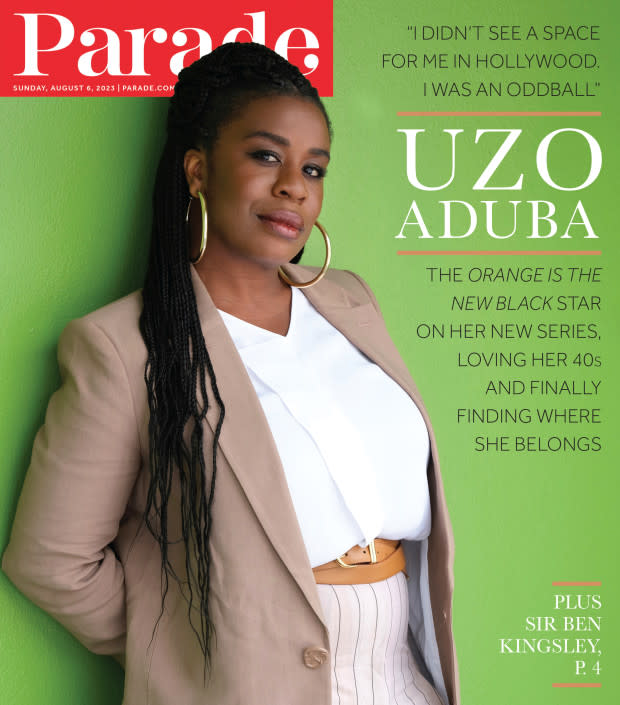
Chris Pizzello/Invision/AP
She got it thanks to the unlikeliest of TV hits. On Netflix’s 2013-19 dramedy Orange Is the New Black—one of the very first original series on the streaming service—Aduba broke out by playing emotionally destructive inmate Suzanne “Crazy Eyes” Warren in an all-female prison. “I loved Suzanne for how much she loves, how authentically she loved and her freedom of spirit,” she says. The role earned her two Emmys; she won another in 2020 for playing politician Shirley Chisholm in Hulu’s Mrs. America and was nominated a year later for her work on the HBO drama In Treatment.
Now she leads the charge in a searing and provocative limited series. Painkiller (premiering August 10 on Netflix) chronicles several players who represented the beginning of America’s opioid crisis—including her Edie Flowers, a medical investigator for the U.S. Attorney’s office on a quest to uncover the truth behind the dangerously addictive OxyContin drug. “She’s the medical equivalent of a journalist,” Aduba says. “And she finds herself in this sort of Alice in Wonderland as she goes down the rabbit hole in getting all the information and the facts. It’s a lingering need to save lives.”
In her Parade interview, Aduba is as friendly-yet-frank as her character. Well, with one exception: Despite hinting that she was planning to “grow things” over the summer, the actress didn’t officially reveal her pregnancy news until a couple of days later at The Tony Awards!
Mara Reinstein: Why was the OxyContin story important to you?
Uzo Aduba: There’s a real secrecy surrounding all of it. I didn’t realize until I dug into it just how many people found themselves exploited by this drug. It really fascinated me that something so popular and so widely used by so many different groups was being ignored. Then I started to read a little more, and I learned about the deliberate and strategic approach to certain communities. So, like Edie, I had a real thirst to expose.
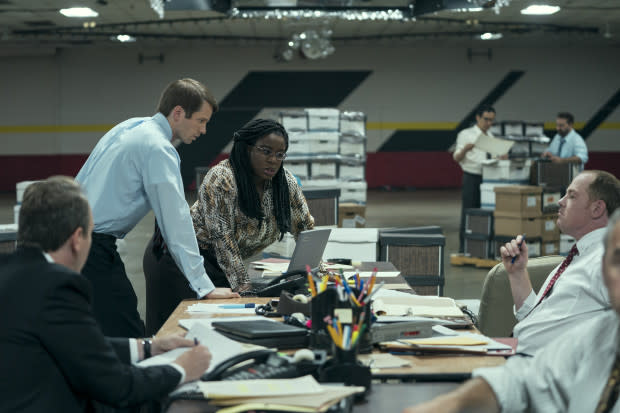
Netflix
Is Edie based on a real person?
She’s a composite character. But many of the characters are real, like Richard Sackler [Matthew Broderick]. The Sackler family founded and owned Purdue Pharma, so they’re behind all of it. [Purdue filed for bankruptcy in 2019.]
Do you have any personal experience with this topic?
There has been a loss of life within my extended family-friend group. It’s funny because I just got home from the dentist and I remember that about 10 years ago, I had my wisdom teeth pulled out. My mom [Nonyem] called me after and asked how it went and if I was given any medication. She had watched all these reports on Dateline and 60 Minutes. I told her I was prescribed OxyContin and she was like, “Take it only today and then toss the rest!” The next day she called to make sure I did it. And this was just for wisdom teeth. It’s not like I had a terminal illness.
Speaking of your mom, what did she make of your career?
My mom passed away about two and half years ago. And she was so proud, even from the time I was doing regional theater. I feel like I should give all my acting credit to her because in my early days when I was really fumbling, she put on a brave face. She was probably panicking at night and didn’t let me know. This is evidenced by the fact that she would come visit me and stock my entire fridge. But my parents were immigrants and my mom always used to say to me and my siblings, “My American dream is for you to be able to live your dream.”
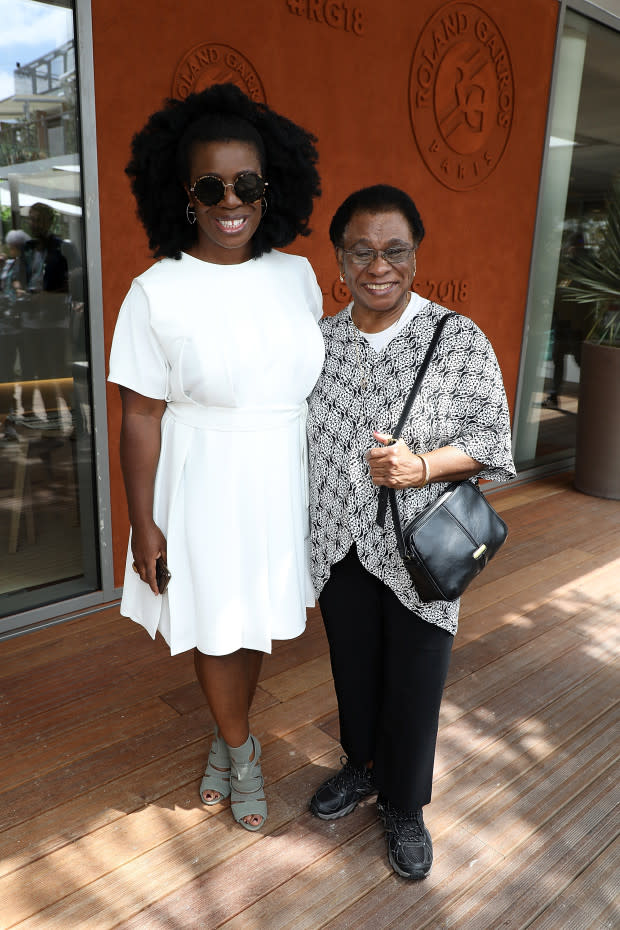
Getty Images
Was she a little surprised that you went into performing arts?
From up until my junior year of high school, I was going to be a lawyer. I talked all the time and was a good debater, and they thought it was a sensible career. Like, if you’re not a doctor or a lawyer or an engineer then disappointment is your fourth option because you need security. But it was a teacher who put the idea in my head of going to art school. And they were supportive!
What was the biggest obstacle as you went forward in your career?
Hmmm. I would say seeing where I belonged. You want to have a seat at the table and an invitation to the party. Sometimes you have to see it to believe it. I had never really seen many examples of my existence or a seat for me anywhere. It felt very intimidating for me to go up to that table and pursue my dream to the fullest and have people see me in the same power that I saw myself. It took a lot of brave souls, frankly, from casting directors to directors to writers, to finally put me in the center and not off to the side or in the background.
Were you satisfied being a successful theater actress or did you long for more?
The year before I got Orange, I started to get honest with myself about what I really wanted. And going back to the idea of the seat at the table—like, I didn’t even dare honestly to dream of anything beyond the theater. I didn’t see a space for me in Hollywood. I was an oddball.
Related: Orange Is the New Black Star Uzo Aduba Makes Big Reveal at the 2023 Tony Awards
Are you saying this as a Black female stage star?
I’m saying this as a gap-toothed, dark-skinned Black actress with an African-sounding name. There’s more nuance to it. This was a very different time—there was no Idris Elba or Chiwetel Ejiofor or Lupita Nyong’o. It was more than 10 years ago but feels like 100 years ago.
Did you consider changing your name?
In my culture, the keeping of one’s name is important. Giving that up would be giving up so much of myself.
Did you go on a lot of auditions during that time?
Not a lot. I had been living in New York for about nine years and only auditioned for about four things total. That’s a combination of not being thought of and not being called and not being daring.
And even when you do audition for Orange Is the New Black, it’s for a brand-new TV service!
Yes. Yes. Girl, yes. Forget about even the audition. Even while I was shooting it, I was walking around telling people, “Oh, I’m doing this thing for Netflix.” And they’re like, “What’s that?” People only knew Netflix because it sent DVDs in the mail. So, I said that it was a web series and maybe it was going to come out on YouTube. It helped that House of Cards came out first because that was a reference point, but I still had to be like, “There’s something called a ‘Smart TV . . .’”
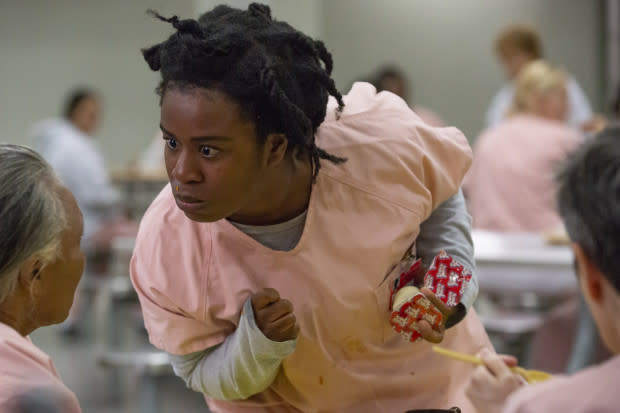
Netflix
When did you start getting recognized?
This is a true story: I was on a mountain when Orange came out. I had no cell service, no Wi-Fi, no contact with anybody in the outside world except this small theater community in Utah. Then I had to go straight to L.A. to do this photo shoot and participate in a press conference for TV critics. I walk into the lobby of The Beverly Hilton, fresh off the plane in a yellow maxi dress. And all these people go up to me and are like, “Oh my God! We love you!” And I’m like, “For what?!” They had all seen Orange and pulled me into the bar to sit with them. It was wild.
Related: The Best Movies of 2023 (So Far)
Why do you think fans responded to the character so fervently? It wasn’t just the hair, obviously.
My knots! I really don’t know. I’ve received letters from people and messages from people telling me that they worked in a psychiatric hospital as a nurse or had a child with special needs or they have special needs themselves and they felt seen. I just loved Suzanne.
Do you only refer to her as “Suzanne”?
I call her Suzanne but have found space for both names—especially because I got other people to love and care about her.
What do you remember about the night you won your first Emmy?
In one year, I went from saying that we were doing a web series to sitting front row at the Emmy Awards with my mom and sister and hearing my name called and walking up on the stage and being given a statue from Morgan Freeman, the voice of God. It was an out-of-body experience. And it changed my life, full stop. You know, my mom was just grateful that I could pay my rent. But I was grateful that I could continue to act and tell these unique stories and meet people who had been heroes of mine for so long.
Wait—Morgan Freeman presented you with the award?!
Yes, and he said my name right! I remember walking up to him and reading the resume in my head. Like, OK, there’s Glory, Bruce Almighty, Million Dollar Baby, Driving Miss Daisy. That is Morgan f—king Freeman, pardon my language.
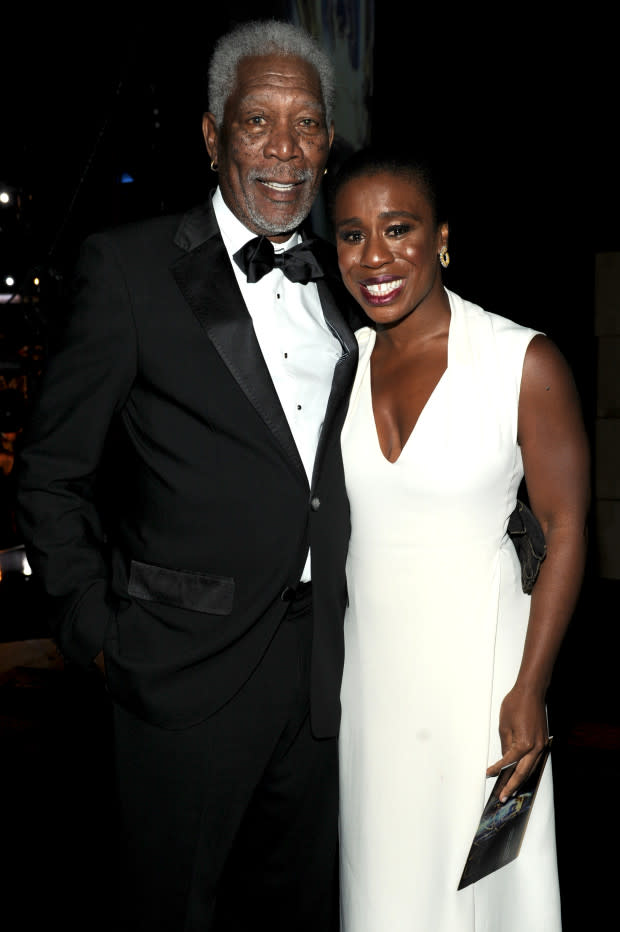
AP/Getty
Who else made you starstruck?
I had a conversation with Meryl Streep, but I honestly don’t remember what I said. Like I do remember hearing her voice coming down the stairs. And it’s like, that’s the one. That’s the queen. And she walked into the room and it was more than you could ever hope or dream. And she was so cool, too! I also got to work with Cate Blanchett [in Mrs. America], who’s another queen and a huge inspiration because of the discipline that she brings to her craft.
On a non-acting note, you’re also a part-owner of the Angel City Football Club in L.A. with Natalie Portman, Serena Williams and Eva Longoria. Why did that interest you?
I grew up in a sports house, women included. I loved the experience of it, but there was a lack of female sports heroes who got prime-time attention. All you saw were tennis stars. But soccer is such a global sport, so when the ask came to get involved, I was so excited. I loved the idea of a female hometown sports team that little girls and boys could look up to as triumphant athletes.
As a former competitive ice skater, could you lace up right now and do a big jump?
Yes. I could do a double axel, triple flip, loop, salchow. All the pick jumps. But I didn’t have a triple loop. And I can definitely still skate!
On the career front, how do you plan on upping your game?
I want to keep transforming, keep growing, keep learning, keep encountering people who I respect as artists who can help bring my own game up. Look at someone like Viola Davis, who’s so superb at what she does. And all my heroes are good humans. I want to be a good human and continue to love what I do.
Would you star in a big shiny Broadway musical and do eight performances a week?
God willing, I would absolutely do that. That’s my background!
It sounds like the 40s have treated you well so far.
Forty and fabulous. Let me tell you something: I’ve wanted to be 40 since I was 25. I was itching for my 40th birthday. And I really love it. It makes me want to know what 50 is going to be like. In my culture, you’re supposed to grow old because the opposite is far worse. So, I want to continue to enjoy this energy and keep the adventure I have in my life and do what makes me happy.
Stream Painkiller on Netflix starting August 10, 2023.
*Interview conducted in June 2023 before the SAG/AFTRA strike
Next, It's Official! The 2023 Primetime Emmys Will Not Be Held in September